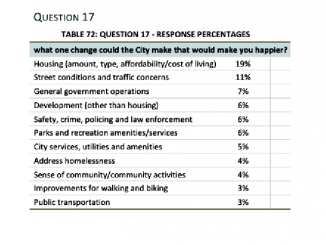
OPINION
BY DAVE PRICE
Daily Post Editor
I’m sure many mid-Peninsula residents who have been fighting Senate Bill 50 breathed a sigh of relief when they learned the Senate Appropriations Committee put the bill on hold until January 2020.
The bill would have radically changed the mid-Peninsula. It would have allowed developers to bypass local zoning and put up high-density apartment and condo complexes. It would have changed our suburban communities into dense cities. And it threatened single-family homeowners, who could have seen a high-density housing project go up next door.
But the opponents of SB50 shouldn’t see this as a victory. I think SB50 will come roaring back. I say that for several reasons.
Wiener isn’t giving up
First, it’s author, Scott Wiener, is an ambitious politician who wants to make a name for himself in state politics. Tackling the state’s biggest issue — housing — is his vehicle to do that. I’ve been following his career since he was on the San Francisco Board of Supervisors, and it’s clear that he’s tenacious.
Wiener’s first try at bypassing local zoning to allow for more multi-family homes, SB827, failed in 2018, but he didn’t give up. Instead, he talked to the opponents of SB827 and added provisions in his next bill, SB50, that satisfied them to increase support for his legislation.
Secondly, for developers, there’s too much money to be made to let this die. SB50 would allow developers to bypass local planning commissions and city councils, resulting in large projects that have no chance of being approved currently. For developers, SB50 was a license to print money.
Third, some version of SB50 will return because there is a dire housing shortage, and cities aren’t approving enough housing. While SB50 was unpopular locally, there is broad public support statewide for building more housing. That feeling is only amplified by the growing number of homeless on the streets.
Some cities — such as Mountain View and Redwood City — have responded to the demand by approving a stunning amount of new housing. Other cities are dragging their feet.
Here’s the first sentence of a story the Post printed May 2:
“Mountain View City Council approved more apartments in two hours than Palo Alto City Council has permitted in the last five years.”
That really sums it up.
The story went on to say, “Between 2015 and 2018, Mountain View approved a net total of 2,436 housing units, almost six times as many as Palo Alto, which approved just 407 during the same years.”
SB50 will be back. And residents here will find themselves fighting an updated version of this bill, which may have more support.
What should opponents do?
Accelerate the process
My advice is to approve more housing. Approve so much housing that when Wiener argues cities aren’t doing enough, we can show that we are serious about housing — and that we’ve been approving more of it, but on our terms, with local control.
For Palo Alto, that means speeding up the process. A number of developments are in the pipeline. They have to move to completion faster. How do you do that? The developer and the Planning Department should anticipate neighborhood complaints in advance and present projects that respond to those expected complaints.
For instance, housing developments along El Camino need a sufficient amount of parking to ensure that neighborhood streets nearby aren’t flooded by the cars of tenants. Figure out in advance how much parking that would be, and then put it into the development, rather than holding hearings on a plan that lacks sufficient parking that gets thrown back to the developer for revisions. In other words, anticipate the problems in advance so the projects can move through faster.
When this bill comes back in January 2020, let’s have some accomplishments to show the Legislature so that they don’t take away local control of zoning decisions.
Don’t look at what happened with SB50 last week as a victory, but an opportunity.
Editor Dave Price’s column appears on Mondays. His email address is [email protected].



Note is made of Scott Wiener’s tenacity, ambition, desire to make a name for himself in state politics, and using “housing” as his vehicle to make a name for himself in state politics.
No matter how much Palo Alto or Menlo Park or any of the cities in the area do I argue it would not suffice to appease Wiener or the developers behind him. It is clear as day there will be pressure for cities to buckle until the developers are appeased and they won’t be appeased as long as money can be made in the conversion of the mid-peninsula into a mini-Manhattan or the area into a sprawl like Los Angeles. Scott Wiener is just a front for the developers and realtors.
I agree the blocking of SB 50 presents an opportunity for cities, residents, and property owners. That opportunity in my opinion is to ramp up efforts to put on ballot a measure or proposition that would prevent the State of CA from overreach into local govt matters (which are best addressed by local govt), and keep what is local (zoning, density, etc.) completely local.
Scott Wiener’s name should go down in State political history as the politicians that prompted property-tax paying homeowners to rise up and protect what they own and pay for: their quality of life, their value of their properties, what happens in their neighborhoods, and their say and control over their local communities without worry of State overreach.
I very much agree with this opinion piece. Clearly the status quo is not working – we just found out that homelessness has increased in the past 2 years across California, during an extremely strong economy and low unemployment. The main opposition to SB50 was that it strips away local control. Now is the time to show what local control can do to tackle our housing crisis. Otherwise, SB50 will only come back stronger next year.
Dave always gets it right when analyzing SB50 and other housing issues. But how would SB50 help the homeless?
In a recently approved affordable housing project in Mt. View, each 380-sf unit costs $700,000.
The billion-dollar companies that caused the crisis are certainly not paying their fair share, developers are using the crisis to get all kinds of exemptions, and cities continue to approve massive office projects.
Thank you to the author for this article – it brings up some valid points. I also agree with Opportunity’s comment that Senator Wiener will not be swayed by cities pulling their weight. This housing problem is not just about supply and demand, it’s about who is buying the market rate housing that SB 50 encourages – spoiler alert – it’s not individuals – instead it’s speculative real estate and financial markets. Those are the big bucks that are influencing Sacramento politicians. Check out this article – https://www.planningreport.com/2019/05/15/open-letter-scott-wiener-sb-50-empowers-wall-street-commoditize-housing-right.
Also there is an effort underway to put a Constitutional Amendment on the ballot – here is a link to learn more. https://www.sustainablecommunitiesinitiative.org/
Unfortunately our opponents who support SB50 are fanatics. They don’t simply want to build more housing, they want our homes. The YIMBYs literally believe single family homes are evil and attribute every social ill to the existence of the suburbs. There’s no reasoning with fanatics so compromise is out of the question. All we can do is be ready for when SB50 comes around again and fight like hell!
I’m in agreement with nearly all of this, but wanted to comment on a few things.
“Between 2015 and 2018, Mountain View approved a net total of 2,436 housing units, almost six times as many as Palo Alto, which approved just 407 during the same years.”
That’s only one side of the story. How many offices did Mountain View and Palo Alto approve over the same period?
Cities don’t control the demand for housing, and cities don’t build housing. Therefore proposals that target only the cities are a drastically inefficient way to solve the problem.
Developers will build only when and where it’s profitable. SB 50 (and related bills) are designed to shift as many costs as possible onto the public in order to make private development more profitable. But that doesn’t mean enough housing will be created, or that it will be affordable for most of the people who need it.
Last year just four tech companies (Google, Apple, Facebook and Salesforce) accounted for 63% of all job growth in Silicon Valley.
I don’t think it’s possible to solve this conundrum without linking supply and demand. The big tech companies are in complete control of demand. They need to take more responsibility for funding the supply. We can do that either directly (head taxes) or indirectly (require balanced jobs and housing growth, which will lead the companies to invest more in financing housing and/or to plan more of their expansion in lower-cost areas). At the moment I don’t know of any other approach that’s likely to be more effective.
>I don’t think it’s possible to solve this conundrum without linking supply
>and demand….We can do that either directly (head taxes) or indirectly
>(require balanced jobs and housing growth, …
Well said. Nothing to add as it hits all the buttons and is comprehensive.